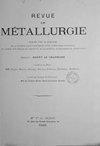Influence of laser power in direct laser deposition on the proportion of ferrite and austenite in duplex steel SAF2507
Revue De Metallurgie-cahiers D Informations Techniques
Pub Date : 2020-01-01
DOI:10.37904/metal.2020.3517
引用次数: 7
Abstract
This work focuses on the effect of laser power on the proportion of austenite and ferrite in duplex steel SAF 2507. Duplex steels combine the advantages of ferritic and austenitic steels, preferably with an optimal proportion of austenite and ferrite. The effect of laser beam power in direct laser deposition on this proportion of microstructure constituents was studied. The proportion also has an impact on mechanical and corrosion properties, which are essential for this type of steel. Duplex steels are often used in corrosive environments and their mechanical properties and corrosion resistance depend on the proportion of austenite and ferrite. Direct laser deposition (DED) was used for making samples. DED operates on the principle of laser melting of a powder which is carried by the shielding gas into a nozzle. This technology can be used as an additive manufacturing process as well as for surface repairs and modification of components. The samples in this experimental study were printed using several different fixed outputs and the same intervals. One sample was printed using the machine’s automatic mode. Microstructural analysis was performed using EBSD, EDS and light microscopy. The proportion of austenite and ferrite was measured by X-ray diffraction (XRD analysis). The differences in the proportion of ferrite and austenite were minimal, on the order of several percentage points.直接激光沉积中激光功率对双相钢SAF2507铁素体和奥氏体比例的影响
本文研究了激光功率对saf2507双相钢中奥氏体和铁素体比例的影响。双相钢结合了铁素体和奥氏体钢的优点,最好是奥氏体和铁素体的最佳比例。研究了直接激光沉积中激光束功率对微结构成分比例的影响。这一比例也对机械和腐蚀性能有影响,这对这类钢来说是必不可少的。双相钢常用于腐蚀性环境中,其机械性能和耐腐蚀性取决于奥氏体和铁素体的比例。采用直接激光沉积法(DED)制备样品。DED的工作原理是激光熔化由保护气体带入喷嘴的粉末。这项技术可以用作增材制造工艺,也可以用于部件的表面修复和修改。本实验研究中的样品采用几种不同的固定输出和相同的间隔进行打印。一个样品是用机器的自动模式打印的。采用电子能谱仪、能谱仪和光镜对样品进行显微结构分析。用x射线衍射(XRD)测定了奥氏体和铁素体的比例。铁素体和奥氏体的比例差异很小,约为几个百分点。
本文章由计算机程序翻译,如有差异,请以英文原文为准。
求助全文
约1分钟内获得全文
求助全文
来源期刊
自引率
0.00%
发文量
0
审稿时长
24 months

 求助内容:
求助内容: 应助结果提醒方式:
应助结果提醒方式:


